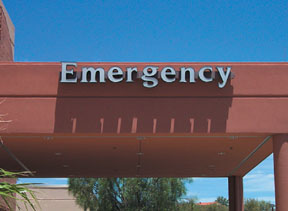Emergencies can and do happen to cats, no matter how carefully we try to protect them. If your veterinarian does not provide coverage for emergencies after regular office hours or on weekends, at some point you may find yourself frantically searching for the nearest veterinary emergency hospital. A little advanced planning and preparation, however, can reduce panic and ease the trauma of a feline crisis. Heres what to expect during an emergency visit and how to save precious minutes that may help safeguard your cats life.
Call ahead. Take a moment to contact your veterinarian or the nearest veterinary emergency clinic before leaving. A veterinary professional will determine if your pet should be brought to an emergency hospital and will offer advice on how to proceed. Above all, a quick call will prepare the emergency staff for your arrival and help them know what to expect.
Stay focused and dont speed. Get to the hospital as quickly and safely as possible, says Kenneth Drobatz, DVM, professor of critical and emergency medicine and director of Emergency Service at Matthew J. Ryan Veterinary Hospital at the University of Pennsylvania. Rushing through traffic will gain little time, may aggravate your cats injuries or cause an accident. Focus on getting your cat to the hospital and stay as calm as possible – thats the most important thing you can do for your pet, he says.
Bring another person. If possible, enlist a friend or family member to help in an emergency. If youre very upset and have a friend who can drive you to the hospital, great! Your friend will probably be calmer than you, Dr. Drobatz notes.
Handle with care. Even the most docile, sweet animals will bite their owners in reflex when touched in a painful area, Dr. Drobatz emphasizes. To avoid this, dont lift an injured cat with your bare hands. Use a blanket and handle your pet very carefully, he recommends. While they generally travel best in a cat carrier, cats that are severely injured should be placed on a firm board or other flat, smooth surface to minimize back movement.

288
Trust the process. When you enter an emergency hospital, you can expect a higher stress environment than a regular veterinary clinic. The priority is to take care of your pet and its condition, Dr. Drobatz emphasizes. Unlike typical veterinary exams – especially if the animal is critically ill – in most instances you will not be able to be with your cat. Instead, youll be asked to stay in the waiting room.
Its important to give the doctors and nurses a chance to try and help your cat if its in a really critical situation, he advises. Understand that they will talk with you as soon as possible, but their first priority is to try and stabilize your pet. Stabilization may include everything from IV fluids and oxygen support to blood transfusions and needed medications.
Be patient. While it is understandably difficult and frustrating to wait for information about an injured or ill pet, in this case no news may be good news. At our hospital (which fields more than 11,000 cases a year in the emergency room), we try to go out and let people know what is happening, what were trying to do, and we try to keep them updated as things go on, Dr. Drobatz continues. If things really take a turn for the worse, well call an owner straight in and talk to him, he adds.
What happens next? The goal is to stabilize and monitor your cat until she is well enough to return home or to your regular veterinarian for ongoing care. At the Ryan Veterinary Hospital, cats that require emergency hospitalization may stay overnight or be transferred to other needed veterinary specialists within the hospital, such as internal medicine or surgery.
Be prepared to pay. Fees are generally due at time of service. For example, a substantial deposit may be required when you bring your cat in, with the balance due when he is released from the hospital.
Emergency hospitals need to employ strict payment policies for good reasons. Maintaining a state-of-the-art hospital, fully staffed 24 hours a day, is costly. In addition, emergency clinics have no recourse if someone leaves an animal and disappears without paying for services. Unfortunately, it happens all the time, Dr. Drobatz says.
While they must enforce strict policies, emergency hospital personnel frequently work with clients to resolve payment issues. Our philosophy here is that if an animal has an immediately life-threatening condition, we will take care of it as long as the owner is aware that he or she will be responsible for the full bill, Dr. Drobatz explains.
To offset the high price of emergency care-which can cost anywhere from a few hundred dollars to thousands of dollars-consider creating a rainy day fund, and check out pet insurance companies to compare coverage, he recommends. In an emergency, a little advance preparation can make all the difference for your cat.
Do the groundwork. Before an emergency occurs, its a good idea to plan ahead. Find out what your veterinarian recommends for emergency care, and ask about a good emergency clinic in your area, Dr. Drobatz suggests. Keep the telephone number handy and know where to go. Before you ever need it, go for a drive and find out where the clinic is located.



